Born in Hong Kong, Jimmy O. Yang immigrated to the U.S. at the age of 13. Rather than following the conventional path often expected of Asians, he carved out a unique career in comedy.
O. Yang made a name for himself with his deadpan delivery as Jian Yang on Silicon Valley, and last year, he took on his first lead role in the series Interior Chinatown, which deeply resonated with the audiences by authentically portraying the mindset and experience of Asian immigrants. In addition to acting, O. Yang is an accomplished stand-up comedian with two hit specials: Guess How Much? and Good Deal. He’s now touring a third special—and for the first time, he’s brought his distinct Hong Kong-style humor back home.
In Cantonese, there’s a term “dong duk siu” for stand-up comedy, but among the 80,000+ Chinese characters, there’s no precise word to describe someone who performs it. “Comedian” or “comic” somehow doesn’t feel quite right, reflecting how unfamiliar the concept still is in many parts of Asia. Yet a Hong Kong-born performer has become a breakout name on the global stage through this very craft. O. Yang’s stand-up draws from stories of his family and his life as an immigrant, highlighting the Asian diaspora experience with wit and ease. On set, he greets us warmly in Cantonese and eagerly digs into dim sum, his relaxed demeanor making it hard to believe he’s been away from Hong Kong for years—it feels like he’s home. In one of his specials, Jimmy revealed that his Chinese name, 萬成 (Man Sing), reflects his parents’ hopes for him to “achieve ten thousand successes.” And step by step, he’s living up to that name.
Food: The Language of Love Among Asians
What’s the biggest cultural difference between life in Hong Kong and the U.S.?
There are many. I moved from Hong Kong to Los Angeles, and in LA, you need a car to get around. But in Hong Kong, I loved walking and taking the MTR. When it comes to food, I still prefer Cantonese cuisine. Everything is so convenient in Hong Kong—you’re never far from something delicious. In the U.S., you have to drive to places like Monterey Park or San Gabriel to get decent Chinese food.
What was the hardest thing to adjust to after immigrating?
Definitely the language. Even though we learned English in Hong Kong, people in the U.S. speak so fast and use a lot of slang. In Hong Kong, 99.9% of my classmates were Chinese. It was interesting but also a big adjustment to suddenly make friends with people of different backgrounds.
In Hong Kong schools, we stayed in the same classroom while teachers came and went. In the U.S., I had to walk to a different classroom for every subject. At 13, it felt really isolating. And in PE class, everyone wore boxers while I was still wearing my Hong Kong-style “tighty whities”. I got teased. The first thing I did when I got home was beg my parents to buy me boxers.
In your view, how do Asian families express love?
I remember visiting an American friend’s house for the first time—they were super affectionate and would say “I love you.” But their dinners were really simple, like, just a chicken breast. At home, my parents never said “I love you” or hugged me, but everything they did was full of care—helping me with homework, cooking a variety of dishes. Food and acts of service are our love language.
I think Asians are full of love—we just don’t say it outright. When I go out to eat with my childhood friends, we still pour tea for each other and make sure everyone’s eating.
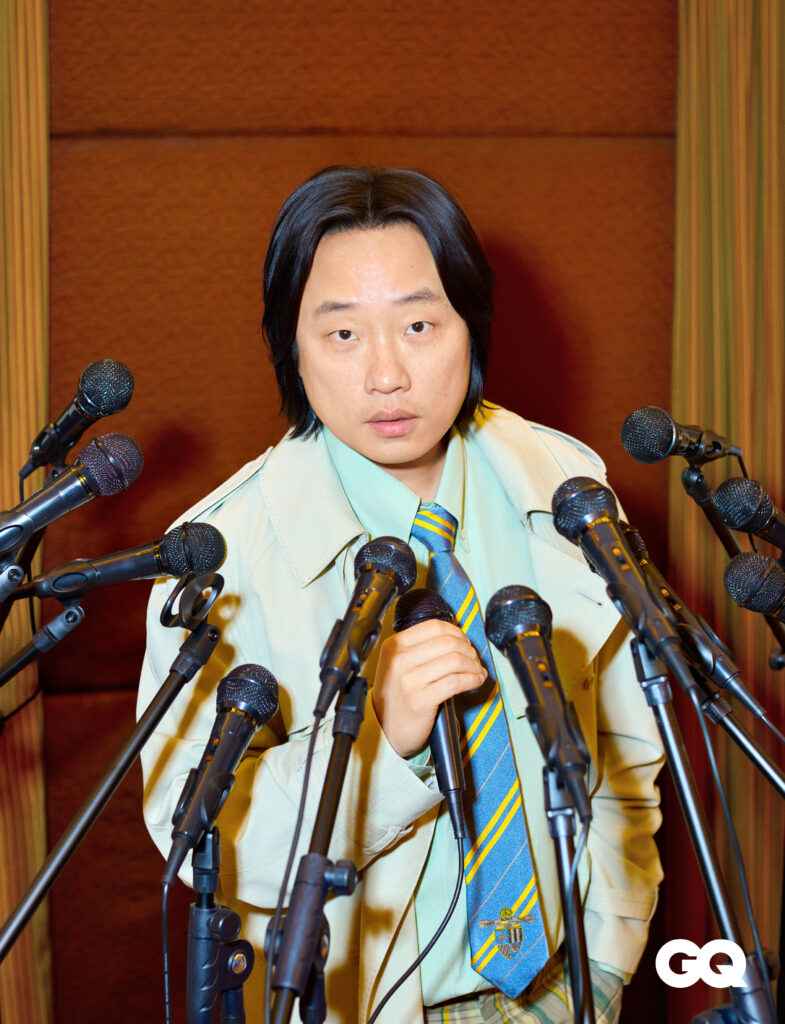
I think Asians are full of love—we just don’t say it outright.
What did your parents think when you decided to pursue showbiz?
At first, they didn’t know how to respond. My dad hoped it was just a phase and that I’d eventually return to finance. They had no idea what stand-up comedy was. Back then, there were hardly any Asian faces in the field in the U.S. But they weren’t against it—they just wanted me to have a stable life and not end up homeless.
I disappointed them for several years. But I kept at it, determined to show them I could succeed. Once I started getting acting roles and signed on as a series regular on Silicon Valley, they finally relaxed and knew I wouldn’t starve.
You often talk about your parents in your routines. How did your upbringing shape who you are?
I was born in Hong Kong, but my parents are from Shanghai. Their Cantonese wasn’t perfect, and people used to mock them as “Shanghainese.” So in a way, they were immigrants within Hong Kong. Then we moved to the U.S., but no matter where we were, my core family was always close.
In the beginning, I told generic jokes. Later, I realized that sharing personal stories resonated more and kept audiences hooked. My family is both hilarious and very traditional—my mom is super frugal, and my dad’s a charismatic actor. Even though we’re in the U.S., Asian audiences relate to their stories. The more personal your material, the harder it is for someone else to copy. People don’t just come to laugh—they want to understand me and my family. That insight took my comedy to the next level.
I know most people love Guess How Much? That might be my best joke—at least the one that audiences have crowned as such.
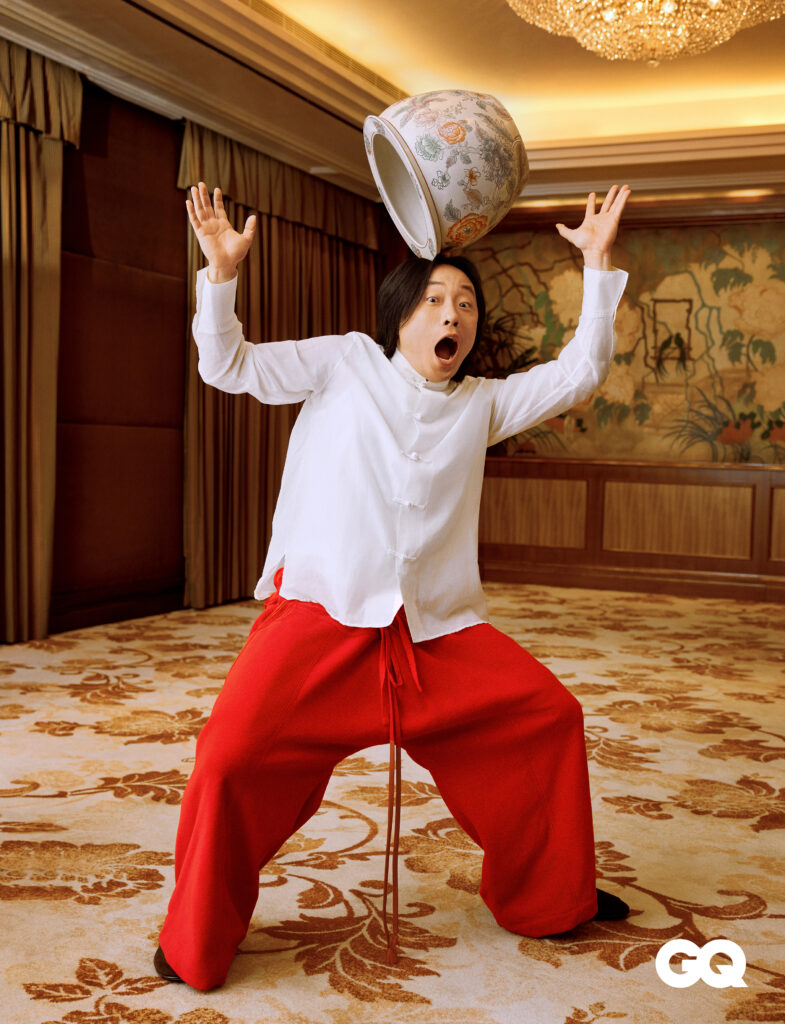
Man Sing: A Thousand Successes
What’s the funniest joke you think you’ve ever written?
Tough call. One of my favorites is from my second special—it compares how Chinese and Western chefs cook. It’s a topic I’m proud of, even if it’s not talked about often.
But I know most people love Guess How Much? That might be my best joke—at least the one that audiences have crowned as such. Everywhere I go, people mention it. It’s based on a true story about my mom. She used to be nervous about me talking about her on stage, but eventually she said, “Aren’t the best parts of your show about me anyway?”
When did you first realize you had a talent for stand-up?
In high school, during a public speaking assignment in English drama class. Most students gave serious speeches—I just had a loose outline and riffed funny stuff off the cuff. The teacher praised me for being natural and relaxed, which made me realize I might be good at this.
At 21, I went to my first open mic and started testing the waters. Nobody’s great the first time—they have to build up from five minutes to ten, then fifteen. It took me ten years to reach my first hour-long special.
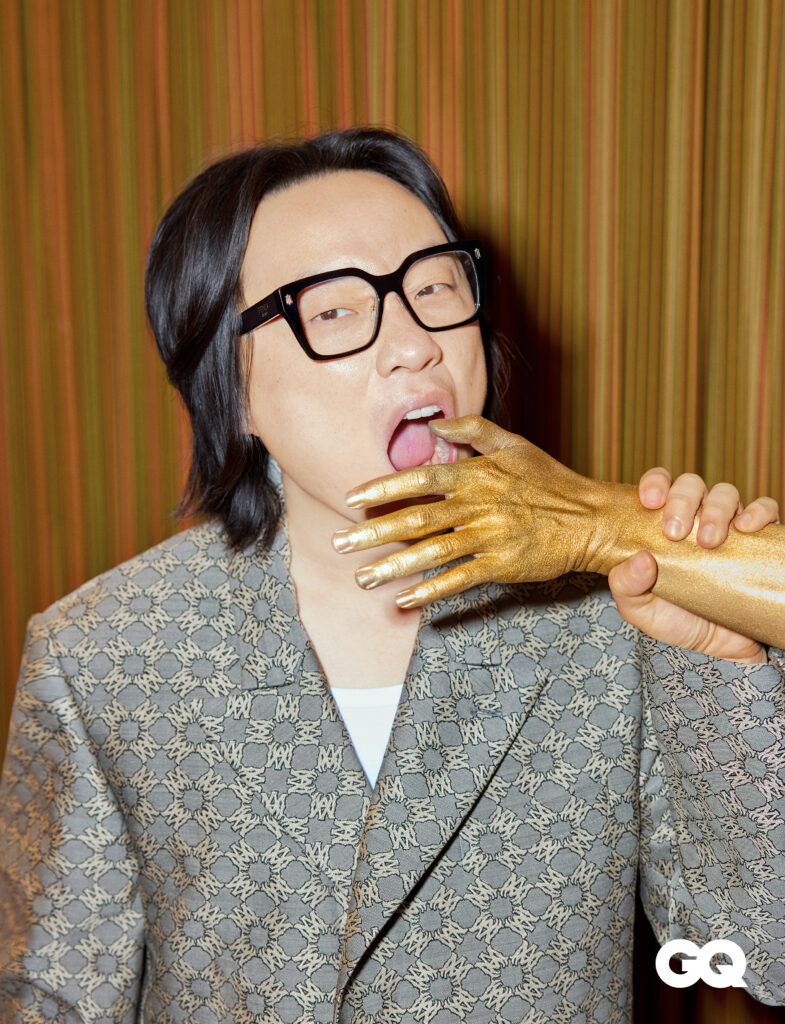
Building a good set is like forming a basketball team—only the All-Stars make it to game time.
What’s your creative process for stand-up? Where do your ideas come from?
You’ve got to observe life closely and take time to roam. I think no matter how successful a comedian becomes, they should keep a regular-person mindset—ride taxis, eat local food, observe daily life. That’s how you gather material.
Sometimes my parents say things they think are ordinary, but I catch the humor in them. You need to keep testing material. Even after 15 years, I still drop in on open mics to try new jokes. Kevin Hart does it. Dave Chappelle does it. That’s how you find out if something resonates. You figure out whether it’s the content or the delivery that’s funny, and then decide what to keep or drop. Building a good set is like forming a basketball team—only the All-Stars make it to game time.
What’s the difference between doing comedy in Chinese and English?
I’ve tried tossing out some Cantonese in Texas. Even if people don’t understand it, they still laugh because there’s a rhythm to it—and then I explain and teach them a bit of the language. But performing in Hong Kong, where everyone understands Cantonese? I’m really looking forward to that. Cantonese has tons of unique slang and its own flow. I want to balance both styles well.
What does Interior Chinatown represent for Chinese immigrants—and for you personally?
The show is based on a well-written novel that explores the portrayal and lived experience of Chinese people in America, including history I hadn’t known before, like the Chinese Exclusion Act. Though the show blends comedy and kung fu, it also touches on serious themes.
For me, it was surreal—from bit parts with only a line or two, to guest roles, to becoming a series regular on Silicon Valley. The show mirrored my own career path in many ways.
After earning critical acclaim for Interior Chinatown, you’re now back on a stand-up tour. What can fans expect next?
I’m keeping an open mind. Stand-up will always be my first love. I’m excited to perform in Hong Kong and across Asia. As for acting, I hope to collaborate with people I admire. It doesn’t have to be in Hollywood—if the project’s interesting, I’m open to working anywhere.
I also rewatched all of Stephen Chow’s films. His deadpan style definitely influenced how I performed on Silicon Valley.
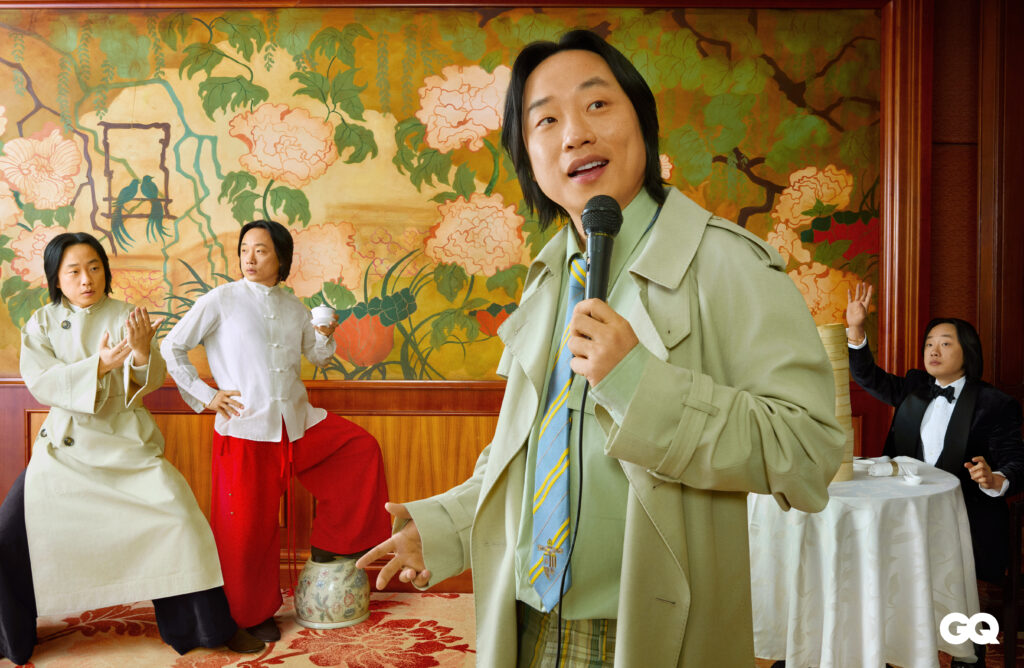
Trench coat and trousers, Yat Pit. Boots, Manolo Blahnik
Shirt and trousers, Yat Pit. Boots, Manolo Blahnik
Trench coat, shirt, trousers and tie, Fendi
Blazer, vest, shirt, trousers and bow tie, Ralph Lauren
Half a Lifetime Away, But Still That Same Kid
What comedy influenced you growing up?
I loved Dayo Wong’s Free Man Show and his stand-up. I grew up watching TVB and found its sense of humor really unique. My favorite series was War of the Genders. When I met Dayo Wong, I even brought my DVD copy to get it signed.
While my American classmates were watching Seinfeld and Friends, War of the Genders was my Seinfeld. I also rewatched all of Stephen Chow’s films. His deadpan style definitely influenced how I performed on Silicon Valley.
What do you remember most about growing up in Hong Kong?
I went to Wah Yan Primary School, then moved to LA in Secondary One. During recess, I’d buy fish-shaped crackers and animal biscuits from the tuck shop. I lived near Tin Hau Temple, and on weekends I’d play football or basketball in Victoria Park. This visit happened to coincide with the Dragon Boat Festival. I’d only ever watched the races on TV before—seeing them live in Stanley was thrilling.
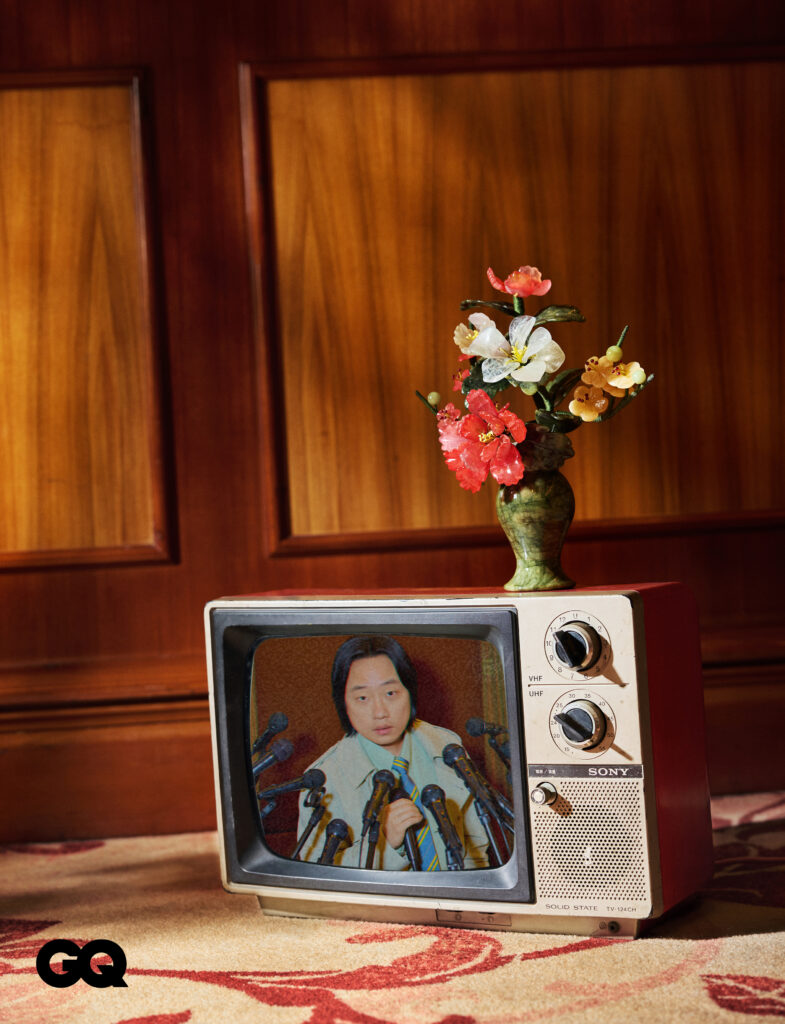
What do you miss most about Hong Kong?
Coming back, I still vividly remember the Causeway Bay area. Just outside Tin Hau MTR station, next to Wah Jie’s shop, I saw the same street where Tai Lee Beef Brisket used to be. The old stationery and sports stores are still there. Nothing much has changed. I even bought my very first pair of Air Jordans here.
Are there any Asian customs or traditions you particularly cherish? What do you hope to do on this trip?
I hope to come back during Lunar New Year someday. I loved going to the flower market in Victoria Park when I was younger. Paying visits during New Year has special meaning—it brings the whole family together.
What makes Hong Kong special in your eyes?
Hong Kong’s culture is incredibly rich—a blend of the old and the new. You might see a grandma cursing paper effigies under a bridge right next to a skyscraper. People still ride the tram. These traditions give the city so much life.
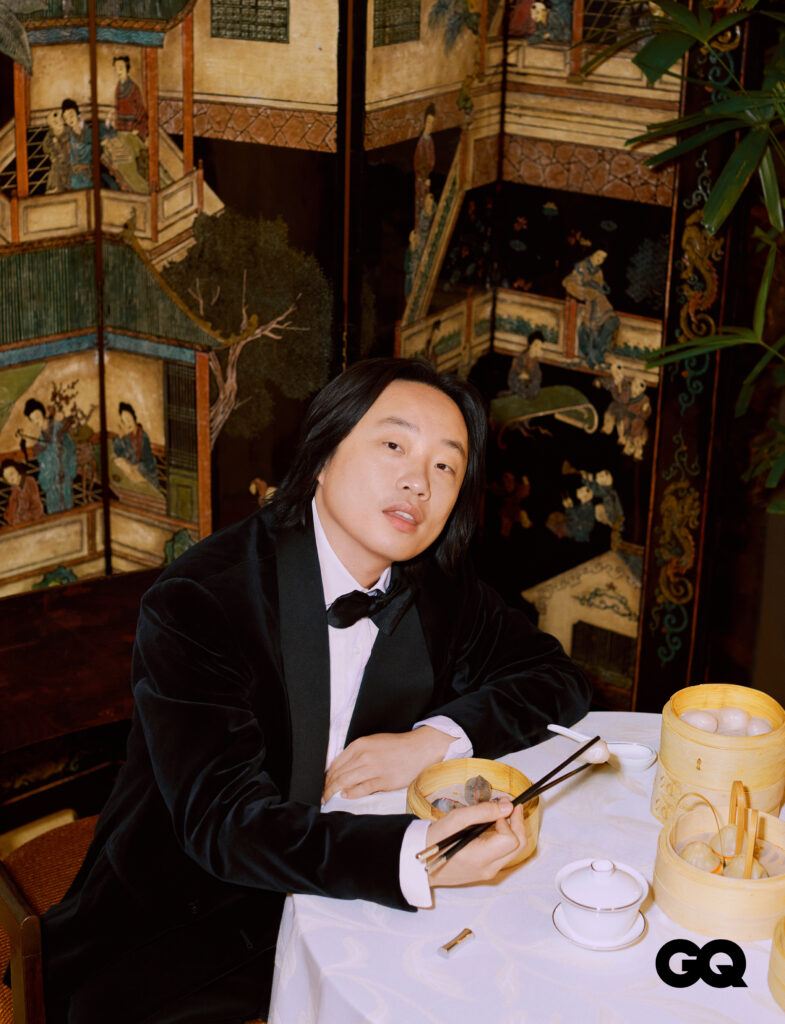
Photographer: Ken Ngan
Editorial Director: Jumius Wong
Creative & Fashion Direction: Jenine Oh
Creative Producer: Marina Fairfax
Casting Director: Second Li
Makeup Artist: Vanessa Wong
Hair Stylist: Keith Wo
Set Designer: Ip Siu
Fashion Assistant: Sing Lei
Photography Assistant: Bo Ku, Siu Keung
Set Design Assistant: Cheng Wai Yi
On-site Coordination: Harrod To
Interview & Text: Sing Lei
Location Courtesy of Mandarin Oriental





